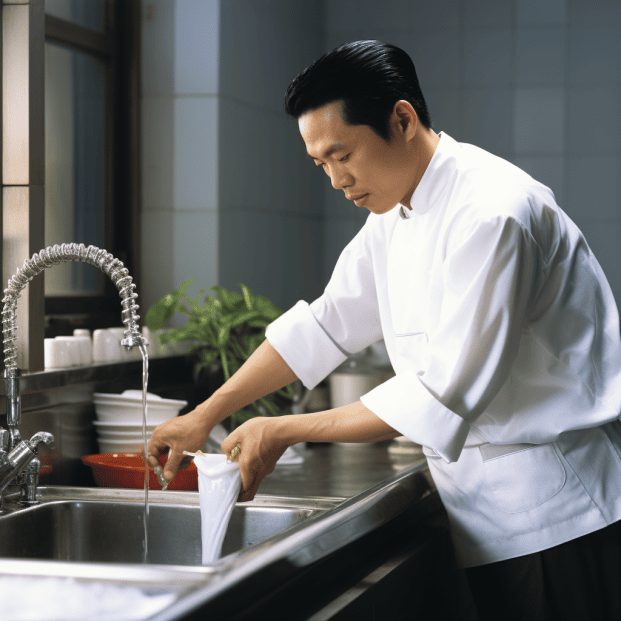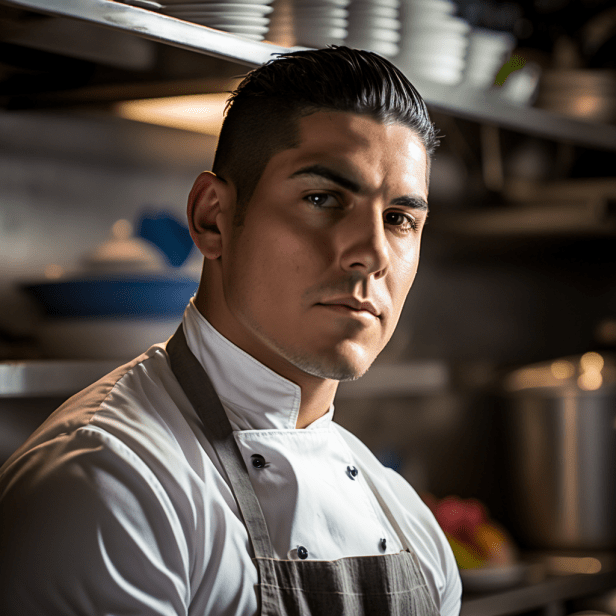Do Chinese really wash rice before cooking?
As a Chinese chef with over 20 years of experience, I can tell you the answer is a definitive yes!
Washing rice is an absolutely essential step in Chinese cuisine.
Now before you start rinsing every grain, know that our rice washing method is quite different from simply dumping rice into a strainer.
We follow a specific technique passed down through generations for clean, fluffy rice every time.
Think a quick splash of water does the trick? Think again!
Let me walk you through the traditional Chinese ritual of rice cleansing, from the meaning behind every step to funny stories from my childhood spent perfecting this skill.
From removing excess starch to revealing the rice’s pure essence, you’ll soon understand why proper washing makes all the difference in our flavorful dishes.
I guarantee after reading this, you’ll never cook rice the Chinese way without rinsing first!
KEY TAKEAWAY
Do Chinese wash rice before cooking?
Yes, rinsing rice before cooking is a common practice in Chinese cuisine. (1)
It helps remove excess starch, resulting in fluffier and more separated grains when cooked.
Importance of Rice Washing
Rice is a staple food for lots of cultures.
But did you know rice has to be washed before cooking? It’s true! When rice is harvested, it goes through a milling process.
This leaves a layer of starch on the grains.
Yuck! This starch can make rice gloppy and sticky when cooked.
No one wants mushy clumps of rice!
By rinsing rice under cold water or bottled water, we wash away the extra starch.
This helps the rice get nice and fluffy when it’s cooked.
Washing also removes any bits of dirt or junk that might be hiding in the rice.
You always want your food to be clean and safe to eat!
Some might say washing rice is optional.
But most chefs, especially Chinese chefs, say it’s essential.
Skipping the wash might leave you with a pan of pasty rice.
Gross! To get light, fluffy rice for the perfect dish, take a few minutes to rinse away that sticky starch.
Your taste buds will thank you!
Rice Varieties and Washing

Rice comes in all different kinds – long grain, short grain, and sticky rice. (2)
As Chinese ingredients, they all act a little different, especially when cooking.
Because of this, preparing each type of rice is a bit unique.
Washing rice before cooking is common in Chinese cuisine.
It involves running the dry grains under cold water.
This removes excess starch and junk.
For many rices, like long grain, this makes the texture better.
The rice turns out fluffier and not sticky.
But some rice actually needs that starch.
With sticky rice, the starch helps the grains cling together.
For these kinds, washing may not be needed.
It depends on the flavor and texture you want.
So the takeaway is you’ve gotta know your rice! Think about the type you’re using and what taste you want.
Some need a good wash, while others are better unrinsed.
Once you know your grains, you’ll be a rice cooking pro!
Cultural Significance

In China, rice is way more than just a food.
It has a long history and deep meaning for the culture.
Rice has been a main part of meals in China for thousands of years! It is at the heart of China’s cooking traditions and cultural identity.
To the Chinese, rice represents abundance, fertility and good fortune.
It is used in religious ceremonies and festivals as an offering, like a symbol of blessing and luck.
When families cook and eat rice together, it shows unity, harmony and strong family bonds.
Washing rice before cooking is an essential step in Chinese cooking.
It removes dirt and extra starch to make the rice taste better.
Washing also makes the rice fluffy and not sticky when cooked.
This texture is important.
There’s also an old belief that washing rice brings good luck and keeps away evil spirits! So you can see, rice is special in Chinese culture.
From history to symbolism, rice has a place of honor.
The act of washing rice honors that cultural heritage.
Effects on Rice
Soaking rice before cooking has some nice benefits! The main effects are shorter cooking time and better texture.
When rice soaks, it absorbs water.
This softens the grains and reduces starch.
Here’s the scoop on soaking rice:
- Shorter cooking: The water makes the rice cook faster, especially brown rice. Soaked rice needs less time over the stove.
- Better texture: Soaking makes rice softer and prevents mushiness. The grains turn out light and fluffy, not sticky or gloppy.
- Less starch: Soaking removes some of the starch from the rice. This can help people managing carbs.
- More digestible: Soaking starts breaking down nutrients in the rice, so your body absorbs them easier. How cool is that?
Bottom line, go for the soak if you want rice that’s tasty and tender! It only takes a little extra time but makes a big difference in the final dish.
Health Considerations
Washing rice before cooking has some great health benefits! Many Chinese people, like my family, always wash rice to make it extra nutritious.
Here’s the scoop on why it’s so good to wash your rice:
First, washing removes any dirt, dust, or icky stuff that might be stuck on the grains.
Yuck! It’s important to rinse away those impurities so you don’t eat anything gross.
Washing also takes off extra starch.
Too much sticky starch makes rice gloppy and mushy.
No one likes a pan of goopy rice! Washing leaves you with nice, fluffy grains.
Finally, washed rice is easier to digest.
The rinse gets rid of stuff that could irritate your stomach or make you feel blah.
So you can eat washed rice without any tummy troubles.
For all these reasons, take a few minutes to wash your rice before cooking.
Your body will thank you!
Alternatives to Washing
I know, washing rice takes extra time.
Some people try to skip this step.
But don’t worry – you have other choices to get clean, tasty rice!
- Soak it first: Letting rice sit in water removes impurities and makes it less sticky. Many Chinese cooks do this.
- Quick cold rinse: A fast rinse in cold water can wash away excess starch. No need to scrub!
- Use a rice cooker: These handy machines have a wash cycle to clean rice for you.
- Buy high-quality rice: Expensive kinds like basmati and jasmine are very clean already. No wash needed!
So while washing rice is traditional, you can go another route if you want.
Test different methods to see what works for your schedule and taste buds! With a few tricks, you can skip the wash but still end up with delicious rice.
Best Rice Washing Practices
If you want your rice to be super tasty, with nice fluffy grains, you gotta wash it first! I know, washing rice takes a little extra time.
But trust me – it’s worth it.
Here’s why cleansing those grains is the way to go:
Washing removes sticky starch and any specks of dirt that could be hiding in your rice.
No one wants to bite into a grain of sand! The rinse also stops the rice from getting gloppy and mushy when it cooks.
By swishing away that starch, you end up with beautiful, fluffy rice.
To wash right, put the rice in a bowl and cover it with cold water.
Swirl the grains around with your fingers.
Keep rinsing until the water runs clear, with no more cloudy starch.
Repeat a few times to really cleanse it.
Then you’ll have rice ready to cook to perfection!
While not essential, washing gives the best taste and texture.
For tasty Chinese dishes, taking the time to wash rice is worth it!
Comparing Rice Preparations
There are a bunch of ways to cook rice.
Which method is best depends on the texture and flavor you want.
Let’s compare some popular cooking techniques:
- Steaming leaves rice fluffy and full of flavor. The grains stay light and tender.
- Boiling makes rice very soft and sticky, perfect for congee porridge.
- Soaking rice reduces cooking time and makes grains more tender, especially long rice.
- Washing removes starch for fluffier, cleaner-tasting rice. Great for Chinese dishes!
Test out different methods to find your favorite.
There’s no wrong way – it just depends what taste and feel you like best.
Get creative in the kitchen to cook your perfect pot of rice!
Conclusion
Rice washing may seem trivial, but this cleansing ritual carries deep meaning in Chinese cooking.
Our time-tested technique coaxes out rice’s optimal texture and taste.
So grab a bowl, turn on some music, and zen out as you swish away impurities from each grain.
Let the water run clear as you embrace this meditative practice, passed down from generations of Chinese cooks.
When you follow the proper process, from multiple rinses to gentle agitation, you’ll discover how washing unveils rice’s purest essence.
The proof is in that first bite – clean, fluffy rice that perfectly soaks up any sauce or seasoning.
I hope I’ve convinced you that rinsing rice the Chinese way is integral to our cuisine.
Next time you make fried rice, congee or Nasi Goreng, don’t skip this sacred step before steaming.
Just a few minutes of mindful washing will take your dish from bland to brilliant!
References
- https://www.abc.net.au/everyday/do-you-need-to-wash-rice-before-cooking-it/100538794#:~:text=It%20depends%20on%20what%20you’re%20making&text=%22They%20don’t%20really%20wash,the%20rice%2C%22%20Tan%20says.
- https://www.seriouseats.com/guide-to-rice
Related Articles
- https://bowlakechinese.com/steaming/
- https://bowlakechinese.com/low-sodium-chinese-food-products/
- https://bowlakechinese.com/can-you-steam-with-bottled-water-in-cooking/
Was this helpful?

I am a skilled chef assistant with a passion for Asian cuisine, I have honed my craft through formal training at At-Sunrice GlobalChef Academy and years of experience in the culinary industry. I have extensive knowledge of cooking techniques and herbs and spices, with a particular focus on traditional Chinese dishes. I’m also an author of the book “Delicious Keto Low Carb Chinese Food for Busy Moms and Fitness Enthusiasts” which is sold on Amazon. On my blog, bowlakechinese.com, I share my expertise in Asian cuisine and provide tips and recipes for those interested in low carb Chinese cuisine.

